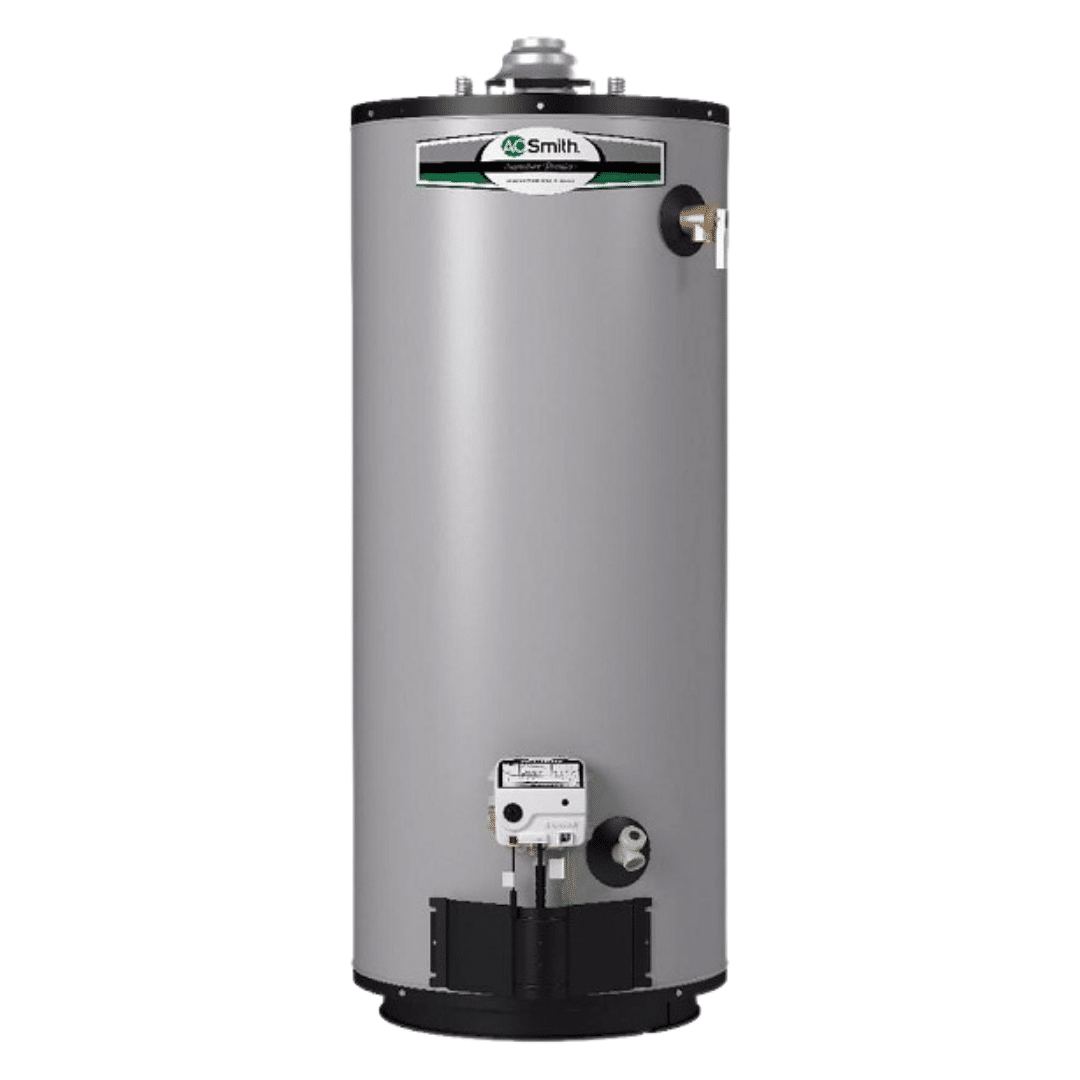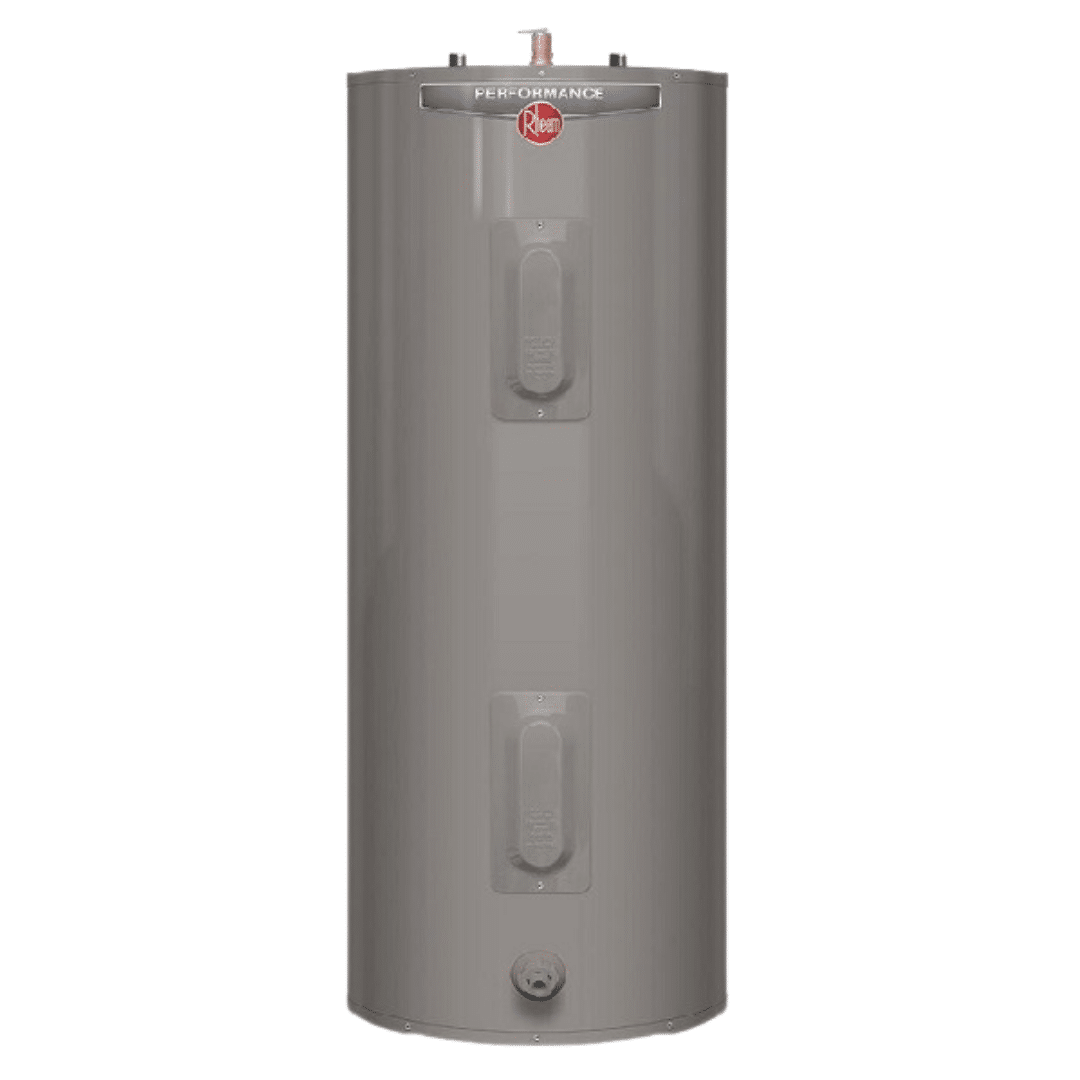Suppose your good old reliable water heater has been around for ten years. In that case, you may need to consider a timely replacement sometime soon. (Related: Water Heater Replacement Cost and Consumer Guide)
Before you begin shopping for the best options in the market today– one crucial decision to make is to choose between gas or electric-powered heaters.
Essentially, both heater types can be pretty similar but with a unique set of pros and cons. Let's dive into the key considerations you need to consider in choosing the right water heater type that's best suited to your home needs.
Deciding Factors to Consider in Choosing Between Gas vs. Electric Water Heaters
It's crucial that you fully understand how each water heater type works individually. Doing so allows you to make an informed decision once you compare it with each other.

Gas Water Heater

Electric Water Heater
Gas Water Heaters
As the name suggests, gas water heaters are powered by natural gas. The cold water enters the tank before it gets warmed by a gas burner. Once the water warms, it rises to the top of the tank before flowing through a discharge pipe. Then, it makes its way out of your faucets or showers.
Note: Gas water heater explosions aren't unheard of, but the advanced technology in modern water heaters guarantees your safety. As such, you can count on gas-powered heaters to be highly efficient. Another huge advantage is that natural gas is cheaper than electricity.
Electric Water Heaters
Standard electric water heaters work similarly to gas units, except they use an electric heating element to jumpstart the convection process. Both water heaters are also made of the same components. But, electric heaters tend to cost you more in the United States.
When electricity is out in your area, this will also affect your hot water supply. This is worth noting if you live in a region with frequent power outages.
Average Costs
In general, gas water heaters present higher initial costs, but they have lower operating expenses than their electric counterparts. In many areas of the country, natural gas is cheaper than electricity.
Expect to pay somewhere between $1,700 to $3,000 to install a standard gas-powered heater at home. Meanwhile, an electric water heater has cheaper upfront costs from $1,000 to $1,750– but the operating expenses reflected in your monthly utility bills may add up in the long run.
The total costs of installing a water heater at home will also depend on the brand, system's size, and quality.
System Efficiency
In comparing the efficiency of an electric water heater vs. a gas-powered unit, you’ll find that electric water heaters prove to be more efficient.
Though natural gas is more cost-effective, it uses more energy to operate and releases waste byproducts into the environment. That said, it’s considerably less efficient than electric heating units.
In contrast, an electric heater utilizes most of the energy it receives to warm up your water– making it more energy-efficient. Always be on the lookout for heaters with an Energy Star label.
Accessibility
Generally, an electric heater will be easier to operate (and manage) than its gas-powered counterparts. As the system operates on electric power, you don’t need to turn on the gas to start it.
Maintenance Requirements
Gas heaters will require more upkeep than electric units when it comes to maintenance. Its gas line and tanks will need periodic assessment to avoid leaks or sediment build-up. But, both systems will need to be regularly flushed to prevent any deposit build-up in the tank's bottom.
Most professionals recommend doing an annual check-up to ensure the longevity of your heater.
Installation
Fortunately, the installation process for the gas and electric water heaters is straightforward. But, making the switch from an electric unit to a gas water heater can be pretty challenging. You will need to run new gas lines in a specific location, which requires creating another vent.
This will increase the project costs and the installation time frame accordingly.
Environmental Drawbacks
As previously mentioned, electric water heaters have a less negative impact on the environment. You can count on electric heaters to be more energy-efficient (with some units powered explicitly by renewable energy sources).
On the other hand, gas water heaters utilize natural gas retrieved from the earth in a rather destructive and wasteful process. It releases harmful greenhouse gases, which makes it less eco-friendly.
Your Home's Power Type
In most cases, homeowners choose between gas vs. electric water heaters depending on the existing power type they have at home. In terms of practicality, it's easier to go with whatever system type your home is already fitted with.
Keep in mind that both gas and electric water heaters are measured by "input," which is the amount of gas or power used per hour to heat the water inside the tank. Gas input is in BTUs, while electric input is widely measured in watts.
On average, a gas water heater has 30,000 to 180,000 BTUs input, based on the system's size. The more BTUs your unit has, the faster it can heat the water. In contrast, electric water heaters range from 1,440 to 5,500 watts.
Average Heating Times
If you're looking for a water heater that provides hot water more quickly, gas water heaters are your best bet. Thanks to its combustion, the gas emits heat more rapidly than most electric heating elements.
Important note: Two numbers that help you determine if a particular system meets the needs of your household are the recovery rate and first-hour rating (FHR).
Despite the same manufacturer and tank size, the number of gas water heaters is higher than their electric models. You can check these ratings on the retailer's description or the manufacturer's website.
Style
Your desired water heater style (tank or tankless) will primarily determine its average lifespan. For your reference, tank water heaters last for 10 to 13 years. Meanwhile, tankless units can last for 20 years or more. (Related: Tankless Water Heater Pros & Cons: Is It Worth It?) Electric heat pump water heaters have an average lifespan of 12 to 15 years.
There’s no need to worry. Regardless of the water heater style you purchase, even if it’s gas or electric, you can still enjoy its lifespan as long as you follow the manufacturer’s recommended annual service and maintenance schedule.
Gas vs. Electric Water Heaters: Which One Should You Choose?
Remember, your water heater accounts for up to 18% of your home's energy use, according to the U.S. Department of Energy.
That said, it is your responsibility to choose the most efficient water heater unit based on your home needs– as no one size fits all. Making the right choice for your home can help you save on utility bills every month.
Perhaps the most significant factor to consider in your decision is your budget– as you will need to cover the initial costs of the unit itself. Browse through different water heaters to choose the best one at your ideal price point.
Frequently Asked Questions (FAQs)
How long do gas and electric water heaters last?
Water heaters (gas and electric) last for almost the same time. The difference can usually be seen between the tank and tankless systems. Tank water heaters may give in as early as 10 to 13 years, while tankless units can last for 20 years. (Related: Tankless Water Heaters: Advantages, Disadvantages & Costs)
Which is cheaper to run between a gas or electric water heater?
Natural gas is typically cheaper than electric when it comes to energy consumption.
What’s a good reason to make the switch from gas to an electric water heater?
Switching your heater type to another is not necessary unless you have problems with your existing water heater. Both water heater types are widely accepted within the industry and can serve you well for years.
